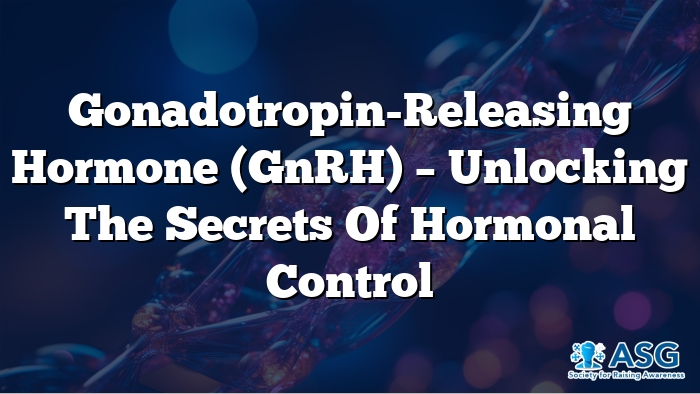Gonadotropin-Releasing Hormone (GnRH) – Unlocking the Secrets of Hormonal Control

Gonadotropin-Releasing Hormone (GnRH) plays a crucial role in regulating reproductive health. This hormone, produced in the hypothalamus, is essential for the proper functioning of the endocrine system. Understanding GnRH is vital for those interested in reproductive health, endocrinology, and related medical fields.
GnRH influences various physiological processes. Its secretion and regulation are complex, involving multiple feedback mechanisms. This hormone's impact on puberty, fertility treatments, and associated disorders highlights its importance. Recent research advances and clinical applications of GnRH analogs offer promising insights into its therapeutic potential.
What is Gonadotropin-Releasing Hormone (GnRH)?
GnRH is a peptide hormone produced in the hypothalamus. It stimulates the release of gonadotropins from the anterior pituitary gland. These gonadotropins include luteinizing hormone (LH) and follicle-stimulating hormone (FSH). GnRH is crucial for the regulation of reproductive functions. Its secretion is pulsatile, meaning it occurs in bursts rather than continuously.
The structure and synthesis of GnRH are complex processes. Peptide synthesis techniques have allowed researchers to study GnRH in detail. This has led to the development of synthetic GnRH analogs used in various clinical applications.
The Role of GnRH in the Endocrine System
GnRH plays a pivotal role in the endocrine system. It regulates the release of LH and FSH, which are essential for reproductive health. These hormones control the function of the ovaries and testes. In women, they regulate the menstrual cycle and ovulation. In men, they influence sperm production and testosterone levels.
The intricate balance of hormones in the endocrine system relies heavily on GnRH. Any disruption in GnRH production or function can lead to a cascade of hormonal imbalances. This highlights the importance of GnRH in maintaining overall reproductive health.
How GnRH Influences Reproductive Health
GnRH is vital for reproductive health. It regulates the menstrual cycle in women. Proper GnRH function ensures regular ovulation and fertility. In men, it influences sperm production and testosterone levels. GnRH deficiencies can lead to reproductive disorders. These include amenorrhea, infertility, and hypogonadism.
The impact of GnRH on reproductive health has led to its use in various fertility treatments. Peptide clinics<

/em> often use GnRH analogs to help regulate ovulation in assisted reproductive technologies. This demonstrates the practical applications of GnRH research in clinical settings.
Mechanisms of GnRH Secretion
GnRH secretion is controlled by the hypothalamus. It occurs in a pulsatile manner. This pulsatility is crucial for its function. Continuous secretion would desensitize the pituitary gland. Various factors influence GnRH secretion. These include stress, nutrition, and hormonal feedback.
Understanding the mechanisms of GnRH secretion is crucial for developing targeted therapies. Researchers in peptide sciences are continuously studying these mechanisms to improve treatment options for reproductive disorders.
GnRH Receptors and Their Functions
GnRH receptors are located on the surface of pituitary cells. They bind to GnRH, triggering the release of LH and FSH. These receptors are crucial for the hormone's function. Mutations in GnRH receptors can lead to reproductive disorders. Understanding these receptors is vital for developing targeted therapies.
The study of GnRH receptors has led to advancements in drug development. Peptide manufacturers are now able to create more specific and effective GnRH analogs based on this knowledge.
Clinical Applications of GnRH Analogs
GnRH analogs are used in various clinical settings. They treat conditions like endometriosis and prostate cancer. These analogs can either stimulate or inhibit GnRH receptors. Their use in fertility treatments is also significant. They help control the timing of ovulation in assisted reproductive technologies.
The development of GnRH analogs has revolutionized the treatment of hormone-related disorders. Peptide suppliers play a crucial role in providing these analogs for clinical use. The safety and efficacy of these treatments are constantly monitored through rigorous peptide quality control measures.
GnRH and Puberty Onset
GnRH is essential for the onset of puberty. It triggers the release of gonadotropins, initiating sexual maturation. Delayed or precocious puberty can result from GnRH abnormalities. Understanding GnRH's role in puberty is crucial for diagnosing and treating these conditions.
Research into GnRH and puberty has led to the development of treatments for puberty-related disorders. This has been made possible through advancements in peptide synthesis and analysis techniques.
Disorders Associated with GnRH Deficiency
GnRH deficiencies can lead to various disorders. These include hypogonadotropic hypogonadism and Kallmann syndrome. These conditions result in delayed or absent puberty. They can also cause infertility. Early diagnosis and treatment are essential for managing these disorders.
The treatment of GnRH-related disorders often involves the use of synthetic GnRH or its analogs. Peptide clinics specializing in reproductive health play a crucial role in administering these treatments.
GnRH and Fertility Treatments
GnRH plays a significant role in fertility treatments. GnRH analogs are used to control ovulation timing. This is crucial for in vitro fertilization (IVF) procedures. Proper GnRH function ensures successful fertility treatments. Understanding its role can improve treatment outcomes.
The use of GnRH in fertility treatments has led to increased demand for high-quality GnRH analogs. Peptide suppliers and peptide manufacturers work closely with fertility clinics to ensure a steady supply of these crucial compounds.
Regulation of GnRH by Feedback Mechanisms
GnRH secretion is regulated by feedback mechanisms. These involve hormones like estrogen and testosterone. High levels of these hormones inhibit GnRH secretion. This feedback loop ensures hormonal balance. Disruptions in this loop can lead to reproductive disorders.
Understanding these feedback mechanisms is crucial for developing targeted therapies. Researchers in peptide sciences are continuously studying these processes to improve treatment options for hormonal imbalances.
GnRH in Men vs. Women
GnRH functions differently in men and women. In women, it regulates the menstrual cycle and ovulation. In men, it influences sperm production and testosterone levels. Understanding these differences is crucial for targeted treatments. It also helps in diagnosing gender-specific reproductive disorders.
The gender-specific aspects of GnRH function have implications for the development of targeted therapies. Peptide manufacturers often create gender-specific GnRH analogs to address these differences.
Research Advances in GnRH Therapy
Recent research has advanced our understanding of GnRH therapy. New analogs and delivery methods are being developed. These aim to improve treatment efficacy and reduce side effects. Ongoing research is exploring GnRH's role in non-reproductive conditions. This could expand its therapeutic applications.
Advancements in GnRH therapy rely heavily on rigorous peptide analysis and peptide batch testing. These processes ensure the safety and efficacy of new GnRH analogs.
Impact of Lifestyle on GnRH Levels
Lifestyle factors can influence GnRH levels. Stress, nutrition, and physical activity all play a role. Poor lifestyle choices can disrupt GnRH secretion. This can lead to reproductive disorders. Maintaining a healthy lifestyle is crucial for optimal GnRH function.
Understanding the impact of lifestyle on GnRH levels has led to the development of holistic approaches to reproductive health. These often complement traditional treatments provided by peptide clinics.
Future Directions in GnRH Research
Future research aims to explore new therapeutic applications of GnRH. This includes its role in non-reproductive conditions. Advances in drug delivery methods are also being investigated. These could improve treatment outcomes and patient compliance. Ongoing research is crucial for expanding our understanding of GnRH.
The future of GnRH research relies heavily on collaboration between academic institutions and peptide suppliers. This partnership ensures that researchers have access to high-quality GnRH analogs for their studies.
Comparing Natural and Synthetic GnRH
Natural and synthetic GnRH have different applications. Natural GnRH is crucial for normal reproductive function. Synthetic GnRH analogs are used in various treatments. These include fertility treatments and hormone-related disorders. Understanding their differences is essential for effective therapy.
The production of synthetic GnRH analogs involves complex peptide synthesis processes. Peptide manufacturers must adhere to strict quality control measures to ensure the purity and efficacy of these compounds.
Conclusion
GnRH is a vital hormone in the regulation of reproductive health. Its role in the endocrine system, puberty onset, and fertility treatments highlights its importance. Understanding the mechanisms of GnRH secretion and its receptors is crucial for developing targeted therapies. Recent research advances and clinical applications of GnRH analogs offer promising insights into its therapeutic potential. Lifestyle factors also play a significant role in GnRH levels, emphasizing the importance of maintaining a healthy lifestyle. Future research aims to explore new therapeutic applications and improve drug delivery methods, expanding our understanding of GnRH and its potential benefits.
The field of GnRH research and its clinical applications continue to evolve. As our understanding grows, so does the potential for more effective treatments. The collaboration between researchers, peptide manufacturers, and peptide suppliers is crucial for advancing this field. Continued research and development in GnRH and related peptides promise to bring about significant improvements in reproductive health and beyond.
Frequently Asked Questions
What is the primary function of GnRH?
GnRH stimulates the release of gonadotropins from the anterior pituitary gland, regulating reproductive functions.
How does GnRH influence fertility treatments?
GnRH analogs are used to control ovulation timing in assisted reproductive technologies, improving treatment outcomes.
Are GnRH analogs safe for long-term use?
While generally safe, long-term use should be monitored by healthcare professionals due to potential side effects.
| Key Points | Importance |
|---|---|
| GnRH regulates reproductive hormones | Essential for fertility and sexual development |
| Pulsatile secretion is crucial | Ensures proper hormone balance |
| GnRH analogs have various clinical applications | Used in fertility treatments and hormone-related disorders |
| Lifestyle factors influence GnRH levels | Highlights importance of healthy living for reproductive health |
